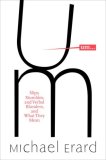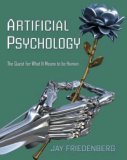May 20, 2008
Um. . .: Slips, Stumbles, and Verbal Blunders, and What They Mean by Michael Erard (Pantheon, 2007).

This book takes a detailed look at verbal blunders of all sorts, as well as attitudes towards them and approaches to cataloging and studying them. The author finds that “…verbal blundering is integral to language, not something that intrudes upon it.” (p. 55)
Pause fillers like “uh” and “um,” restarted sentences, and repeated words are the most common speech disturbances, but they were rarely noticed or commented on until voice recording technologies put everyday speech under heightened scrutiny. Slips of the tongue are the rarest kind of error but perhaps for that reason the most noticeable.
Among the topics treated in the book are “the aesthetic of umlessness” (p. 113), Toastmasters, bloopers, and the verbal blunders of President George W. Bush.
The book includes a section of recommended reading and a “field guide” to blunder terms. The website www.umthebook.com has the full bibliography and endnotes, plus a rich array of supplementary material.
Comments (1)
- Uncategorized
March 5, 2008

Lewis Hyde, author of The Gift: Creativity and the Artist in the Modern World (Vintage), is scheduled to appear tomorrow (Mar. 6) on Bookworm, KCRW (Santa Monica, CA), 2:30-3 pm Pacific time. The program should also be available later as a podcast.
“The gift must always move” is a motto I remember from reading the book many years ago.

Hyde also wrote Trickster Makes This World: Mischief, Myth, and Art
KCRW show details, podcast
Comments (0)
- Uncategorized
February 11, 2008
Artificial Psychology: The Quest for What It Means to Be Human by Jay Friedenberg
by Jay Friedenberg

Is it possible to construct an artificial person? Researchers in the field of artificial intelligence have for decades been developing computer programs that emulate human intelligence. This book goes beyond intelligence and describes how close we are to recreating many of the other capacities that make us human. These abilities include learning, creativity, consciousness, and emotion.
The attempt to understand and engineer these abilities constitutes the new interdisciplinary field of artificial psychology, which is characterized by contributions from philosophy, cognitive psychology, neuroscience, computer science, and robotics.
Comments (0)
- Uncategorized
February 9, 2008
The National Book Critics Circle recently published a list of recommended books, the “Good Reads – Winter List,” based on recommendations from book critics and award-winning authors. The nonfiction short list includes Musicophilia: Tales of Music and the Brain by Oliver Sacks.
There is also a long list of titles that received multiple votes. Proust and the Squid: The Story and Science of the Reading Brain is one of the books on the nonfiction long list, along with How Fiction Works by James Wood, even though it’s not due out until July.

Steven Pinker recommends What is Intelligence?: Beyond the Flynn Effect by James Flynn.
Comments (0)
- Uncategorized







